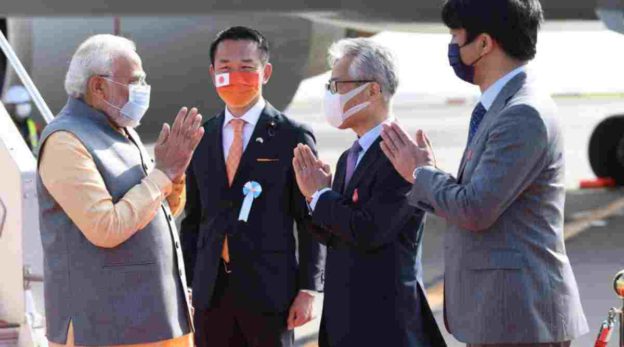Following the tweaking of the US led Indo-Pacific Economic Framework (IPEF); Prime Minister Narendra Modi joined the US President Joe Biden in the formal launch in Tokyo on Monday.
Following the tweaking of the US led Indo-Pacific Economic Framework (IPEF); Prime Minister Narendra Modi joined the US President Joe Biden in the formal launch in Tokyo on Monday.
India became one of the thirteen countries to be the initial partners of IPEF, countries including Brunei, Japan, Australia, Indonesia, South Korea, Malaysia, New Zealand, Vietnam, Thailand, Singapore and Philippines, representing almost 40 percent of world GDP.
During the launch, Prime Minister Modi, President of the US Joseph R. Biden and Prime Minister of Japan Kishida Fumio were present in person and leaders of partner countries were present virtually.
A joint statement issued at the end of the launch, highlighting the key elements of the IPEF, which seeks economic growth, fairness, sustainability, inclusiveness and competitiveness in the Indo-Pacific region.
PM Modi underlines the importance of 3T’s – Trust, Transparency and Timeliness
Expressing India’s commitment towards working with all Indo-Pacific countries for an IPEF which is both inclusive and flexible, PM Modi at the launch stated that for resilient supply chains the focus should be on — Trust, Transparency and Timeliness.
Historically India has been at the centre of trade flows in the Indo-Pacific Region and the IPEF is a declaration of a collective desire to make the region an engine of global economic growth, PM Modi said at the launch.
To tackle the economic challenges in the Indo-Pacific Region, PM Modi called for finding creative and common solutions and added that the world’s oldest commercial port is in Lohtal, Gujarat.
For continued peace, growth and prosperity, India is committed to a free, open, and inclusive Indo-Pacific region and deepening economic engagement among partners.
And towards regional economic connectivity, boosting trade and investment and integration in the region, India is keen to collaborate with partner countries under the IPEF.
With the launch of this framework all the partner countries are expected to start discussions which will focus on economic cooperation, and achieving shared goals.
According to reports, ahead of joining for the launch, India had conveyed to the US that the IPEF will have to be tweaked to convey its publicly articulated vision of a free, open and inclusive Indo-Pacific Region.
An official statement issued by the White House, IPEF launched today is expected to strengthen the US ties in the region and define the coming decades for technological innovation and the global economy. It will also create a stronger, more resilient economy for families, businesses and workers not only in the US but in the Indo-Pacific Region too.
The statement goes on to state that IPEF will enable the US and its allies to decide on rules of the road that ensure American workers, ranchers and small businesses can compete in the Indo-Pacific.
Since tackling inflation is top economic priority, the US President has said that the framework will help in lowering costs and this will be through making the supply chains more resilient in the long term.
Over the next 30 years, the Indo-Pacific Region is projected to be the largest contributor to the global economy with almost 60 percent of the world’s population.
More about the IPEF
The IPEF is going to focus on four key pillars, according to the Fact Sheet issued by the White House.
Connected Economy
There will be comprehensive engagement on a wide range of issues between the US and its partners. High-standard rules of the road to be pursued in the digital economy, and this will include standards on cross-border data flows and data localization.
In order to ensure small and medium sized enterprises can benefit from the region’s rapidly growing e-commerce sector, there will be efforts to seize opportunities and address concerns in the digital economy.
Issues including unethical use of Artificial Intelligence, and online privacy, to seek strong labor and environment standards will be addressed.
Also, corporate accountability provisions which will help to promote race to the top.
Resilient Economy
Keeping in mind the American families, for a resilient economy the focus is going to be first-of-their-kind supply chain commitments which will prevent disruptions in supply chains and to guard against price spikes.
Under this framework an early warning system, mapping critical mineral supply chains will be established as well as coordinating diversification efforts and also improving traceability in key sectors.
Clean Economy
Commitments on decarbonization, infrastructure and clean energy that promote good-paying jobs.
Targets that will accelerate efforts to tackle the climate crisis and new measures to combat methane emissions. Focus on carbon removal, energy efficiency standards, and renewable energy.
Fair Economy
For a fair economy, the framework talks about commitments to enact and enforce effective tax, anti-money laundering, and anti-bribery regimes.
In accordance with UN standards, provisions on the exchange of tax information, criminalization of bribery.
https://www.financialexpress.com/defence/india-joins-the-launch-of-ipef-pm-modi-underlines-the-importance-of-3ts/2534839/





